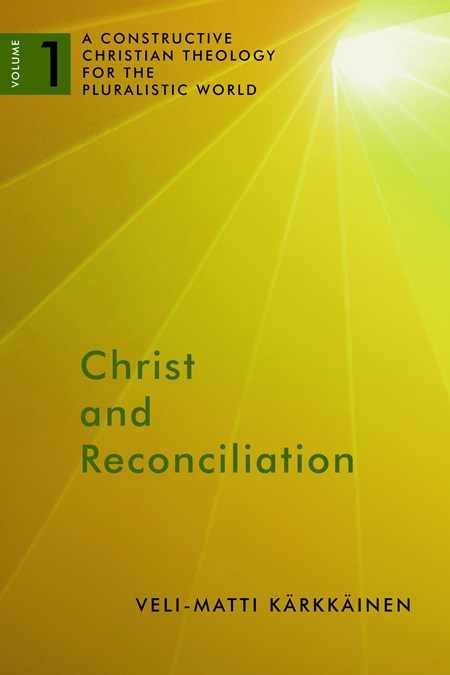Veli-Matti Karkkainen: Christ and Reconciliation
 Veli-Matti Kärkkäinen, Christ and Reconciliation, A Constructive Christian Theology for the Pluralistic World series, Volume 1 (Grand Rapids, MI: Wm. B. Eerdmans Publishing, 2013), 467 pages, ISBN 9780802868534.
Veli-Matti Kärkkäinen, Christ and Reconciliation, A Constructive Christian Theology for the Pluralistic World series, Volume 1 (Grand Rapids, MI: Wm. B. Eerdmans Publishing, 2013), 467 pages, ISBN 9780802868534.
Kärkkäinen, professor of systematic theology at Fuller Theological Seminary and a docent of ecumenics at the University of Helsinki, applies both disciplines to great effect in this first volume. While most systematic theologies tend to be a conversation amongst Christians and often a subset of Christians, Kärkkäinen expands the conversation to include Christians around the world as well as the views of non-Christian religions. He believes that Christian theology must willingly, humbly, and cogently engage the challenges presented by a post-modern and pluralistic world. The openness to engage competing (i.e. Western vs non-western Christianity) and even hostile belief systems (Judaism, Islam, Buddhism, and Hinduism) is to Kärkkäinen a form of hospitality. Honest and open dialogue leads to truth because it helps expose our blind spots and opens up new ways to understand our beliefs and engage other faiths.
The book contains two major sections. Part 1, Christ, investigates the person of Jesus. But rather than simply rehashing biblical and historical teaching on the person of Jesus, Kärkkäinen reviews areas that are not as frequently discussed. For example, he focuses on the dynamics of Jesus’ character and mission, paying particular attention to Jesus’ roles as prophet, liberator, and Spirit bearer. Kärkkäinen’s emphasis on the Spirit’s role in Christ’s ministry is, as he contends, to correct this oversight in many theologies on Christ. In addition, he argues that a dynamic Christology that a spirit Christology can provide can be useful in handling difficulties that abound in discussing the dual nature of Christ’s person. After discussing Christian perspectives on Christ, though not always arriving at a complete conclusion, Kärkkäinen engages alternative theologies and religions as lenses to view Christ and evaluate how the traditional views match up to the evidence.
Part 2, Reconciliation, follows the same process as found in Part 1. Kärkkäinen reviews Christian teaching on Christ’s atoning work and then discusses elements of those ideas in conversation with other belief traditions. Kärkkäinen is respectful of traditional ways of understanding Christ’s atoning work (Recapitulation, Ransom, Christus Victor, Satisfaction, and Moral example). But he thinks that they should be balanced with the reconciliation view, which emphasizes Christ’s work to restore relationships between God and individuals, groups, between groups, and creation itself. Interestingly, Kärkkäinen spends a great deal of space on the issue of the relationship between the atonement and violence and the atonement and liberation.
I must confess that my initial reaction to the introductory chapters on methodology was less than charitable. I fully expected this volume to be yet another book written by an evangelical that had gone soft on the faith in order to dialog with non-Christian belief systems. Fortunately, Kärkkäinen quickly proved my initial reaction to be mistaken. He clearly affirms the historic creeds of Christendom as well as the uniqueness of Jesus Christ. But he also thinks that other faiths and perspectives (such as liberation theology) can challenge Christians to think more deeply about our faith and the person and work of Jesus Christ.
Category: In Depth, Winter 2016


